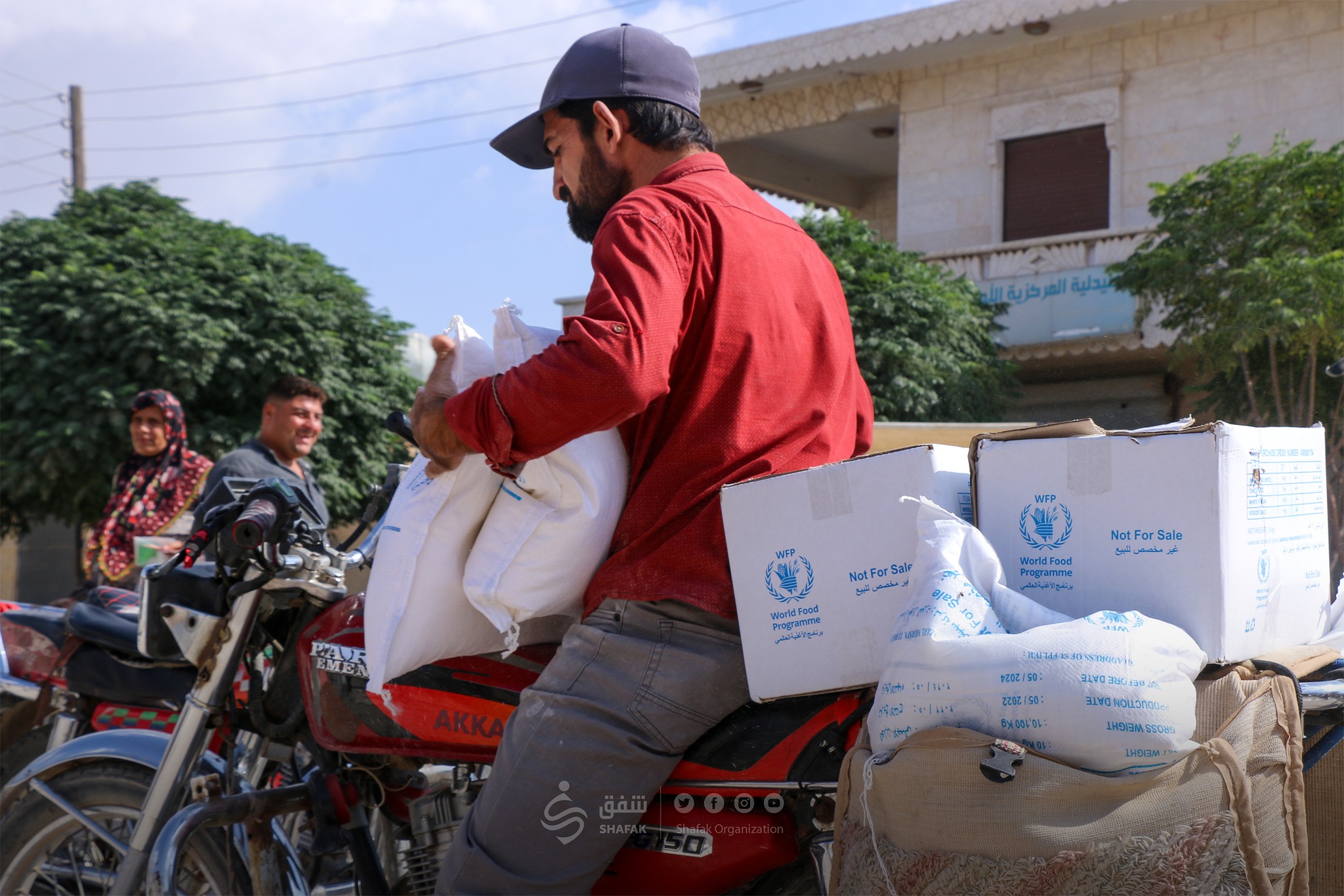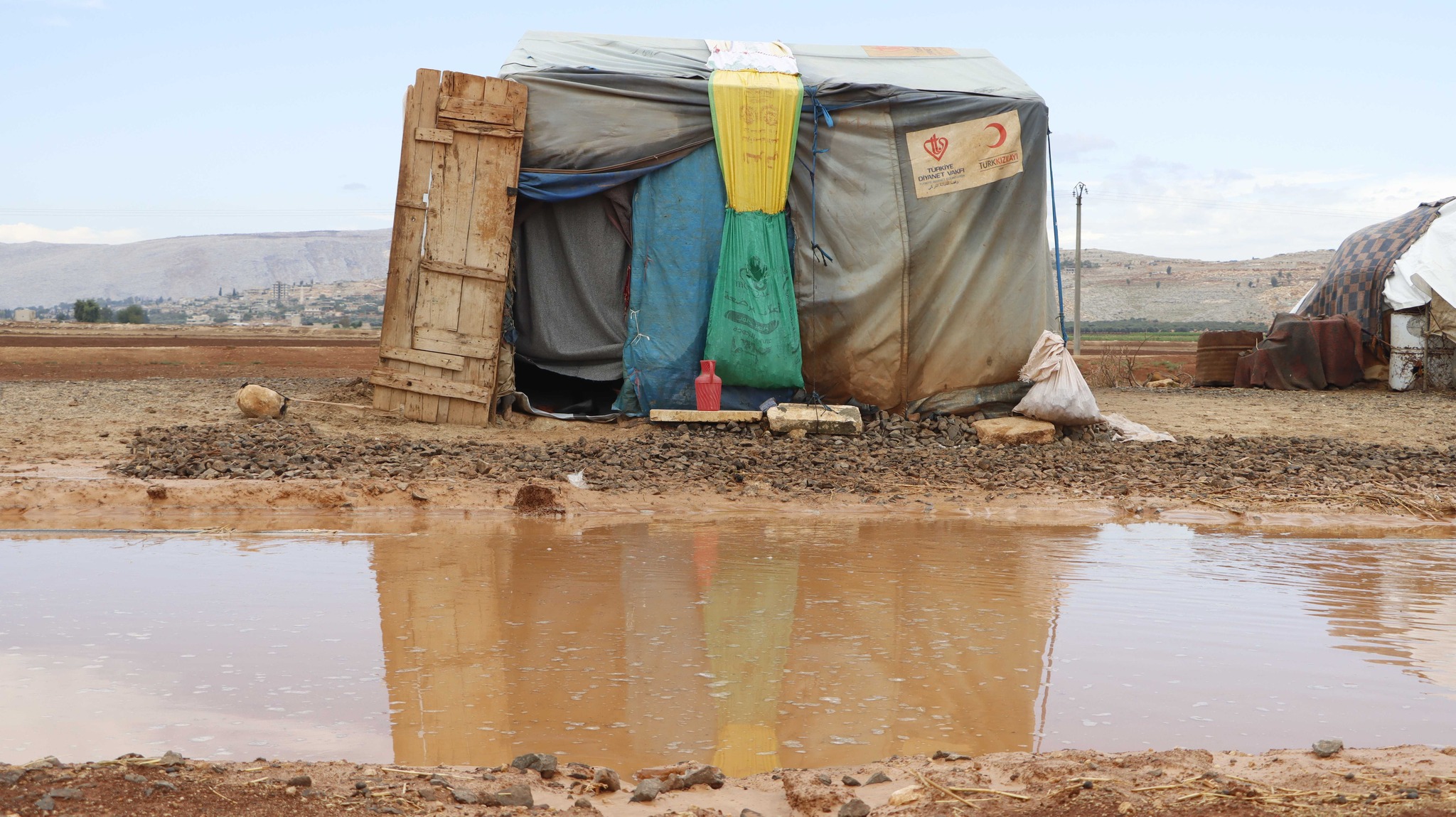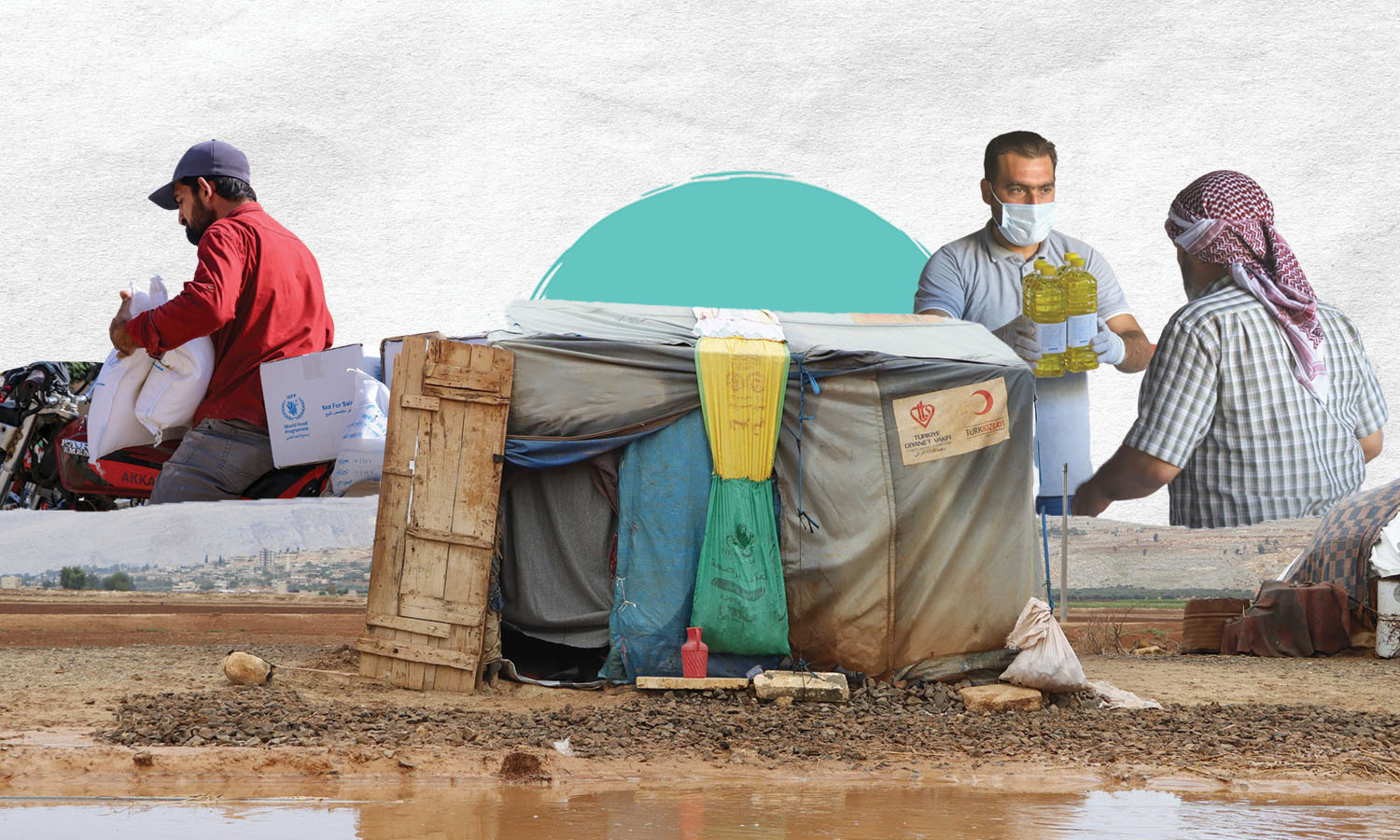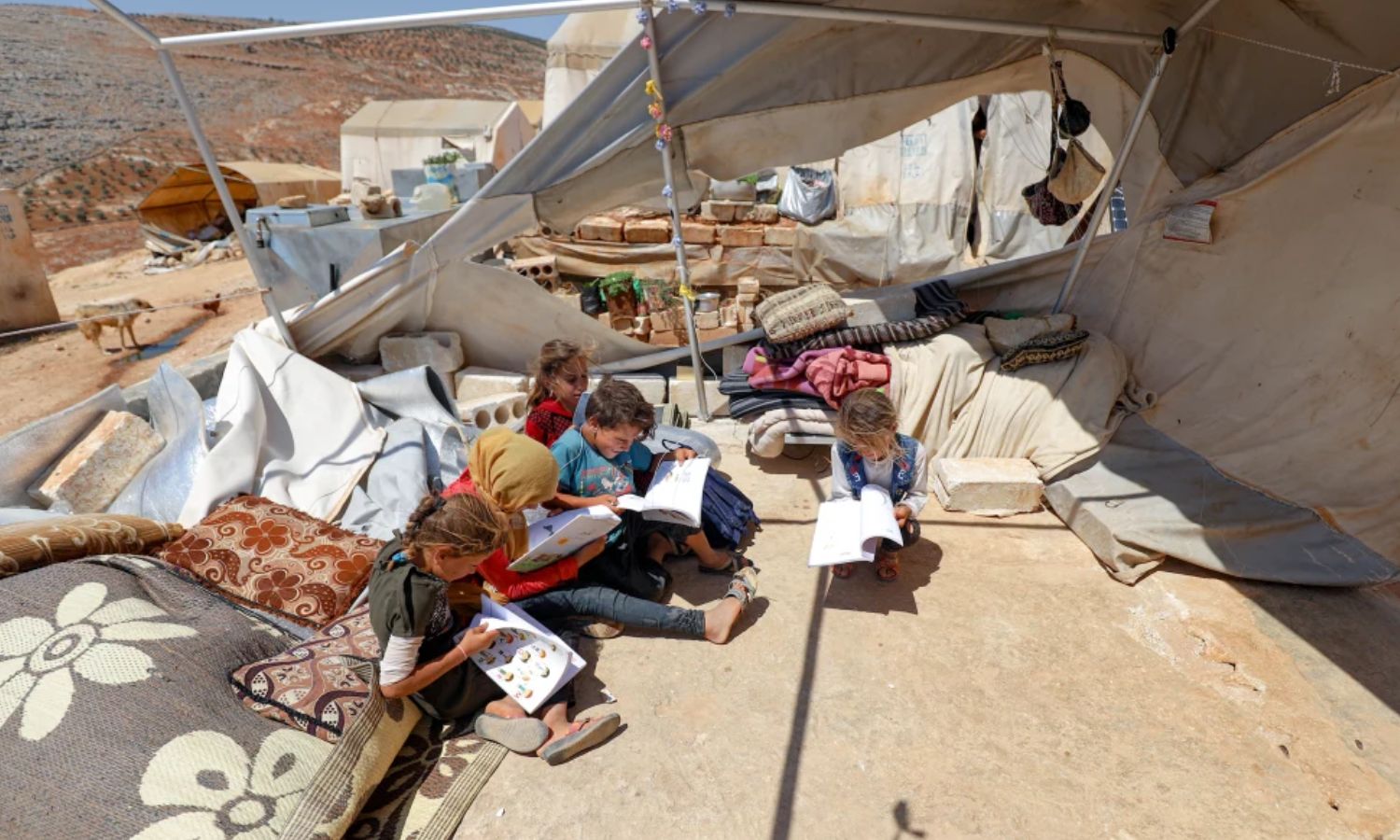Hassan Ibrahim | Lujain Mourad | Muhammed Fansa
It has been four months since the forty-year-old Kawthar al-Halwani last received a food basket in the Kuwait camp near the town of Harbanoush in the northern countryside of Idlib. The woman said that she lives with her two children on “sour yogurt that is often rotten” in addition to the free bread delivered to the camp by a donor residing abroad.
Al-Halwani’s complaint about the lack of aid and her family’s dire living situation is one of the complaints of hundreds of thousands of displaced families living in camps and gatherings of displaced persons in the north of Syria, whose members are awaiting food, medicines, toiletries, heating equipment, and other aids from organizations, without a specific timetable.
Humanitarian and relief organizations share tasks and a map of aid distribution, but their capacity is limited in the face of the needs of 4.1 million people in northwestern Syria, according to estimates by the United Nations Office for the Coordination of Humanitarian Affairs (OCHA). Its efforts are limited to providing aid “cartons” in the absence of permanent solutions or endowment (investment) projects that bring benefits to support the displaced and the needy.
The impact of the organizations’ incapacity and lack of support also increases during winter, with millions of Syrians anticipating a harsh winter this year in the absence of the necessary funding.
In this file, Enab Baladi discusses with organizations operating in the north and researchers the extent to which the aid meets the needs of the displaced, the mechanism by which organizations choose the beneficiaries of their aid and services, the extent to which organizations are leaning towards endowment projects in sectors that benefit them or the displaced, and the obstacles.
The tragedy of every winter
The UN expects Syria to experience one of the harshest winters this year due to fuel and energy shortages and a deteriorating socio-economic situation.
The UN spokesperson, Stéphane Dujarric, said in the daily press conference from the permanent headquarters in New York on 10 October that some 6 million people in Syria needed humanitarian assistance to address severe winter conditions, a 33% increase compared to 2021.
“Those who have been granted priority assistance are displaced persons living in tents or temporary shelters, including 800,000 people staying in tents in northwestern Syria”, Dujarric added. “Some 200 million USD are urgently needed to bridge the funding gap and allow our partners to meet winter-related needs between October and March”.
The urgent need of the residents of northern Syria for aid is exacerbated by the onset of the winter season, which brings suffering of a different kind amid low temperatures and the absence of heating equipment, and the inability to secure it.
In conjunction with the winter crisis in the camps and the delayed response by relief organizations operating in the region, given that there are only emergency solutions, fundraising campaigns are initiated by organizations and activists to avert “the tragedy of every winter” in the apparent absence of prior plans or projects.
The basket does not meet the needs
Al-Halwani, who was displaced from the countryside of Damascus, is waiting for the food aid basket provided by a Saudi donor called Abu Turki to sell part of it in order to pay off her debts. She also resorts to working in any available profession for a daily wage to secure the needs of her two children after the death of her husband years ago.
The food basket does not cover the needs of the displaced families. According to local organizations, the basket provided to families is worth between 150 and 200 Turkish liras, while the World Food Program (WFP) standard food basket sufficient to feed a family of five for one month costs about 81 USD (1505 Turkish liras).
The Syrian Response Coordination Group (SRCG) working in the north of Syria stated that the recognized poverty threshold for the civilian population in northern Syria rose to 4,354 Turkish liras last August. The extreme poverty line rose to 3218 Turkish liras, with the proportion of families below the poverty line reaching 87.11%.
The proportion of families reaching the level of hunger was 38.18%. The basic deficit of humanitarian response operations covered by humanitarian organizations was 60.7%.
Mohammad Abdul-Jabbar, a resident of the Kuwait camp in Harbanoush and a breadwinner for a family of four, said that, although the bread is free from the donor, the food basket he received four months ago does not meet their needs and that its distribution is irregular while relatives in other camps receive a food basket on a monthly basis, in addition to detergents and other cleaning products. He pointed out that the camp did not receive any assistance in the field of toiletries and sterilizers in light of the cholera outbreak.
Abdul-Jabbar added that some of the camp’s residents had gone to other camps as they received greater support.
Adeeb Ismail Khatib, a resident of the “Poor to God” camp near the village of Harbanoush, and his family of six recently received a basket containing hygiene tools from the Mercy organization operating in the north, in addition to the organization providing bread and water in the camp. Like most camp residents, he denied receiving any food basket from any organization for six months.
Determining the beneficiary; Criteria vary for each of the projects
In each crisis, some refugees or internally displaced persons (IDPs) face high protection risks due to their conditions or circumstances. They are known as “individuals with special needs,” who face specific impediments due to their circumstances, identity, or other factors that prevent them from enjoying their rights or accessing the services of which they are in need.
The United Nations High Commissioner for Refugees (UNHCR) has identified the categories of “individuals with special needs,” namely:
- Girls and boys (including unaccompanied children);
- People with serious illnesses;
- Persons who possess legal needs or special physical protection clauses;
- Single women;
- Women-run families;
- The elderly;
- Persons with disabilities;
- LGBTQ (LGBTs and subcultures united by common culture and social movements).
Not everyone belonging to these groups has special needs. Their needs may vary over time or may be affected by their environment, according to UNHCR, which noted that instead of targeting former groups with basic assistance packages, it is necessary to understand how age, gender, and diversity factors overlap in the composition, abilities, needs, and risks faced by the aforementioned individuals.
UNHCR has also developed key points for reaching those in need (with special needs), namely, identifying and consulting them to assess their needs and capacities and identify their shortcomings within protection and assistance programs, consulting them to determine what food and non-food assistance packages should contain, and making sure they are able to receive them.
The communications officer at the Ataa Humanitarian Relief Association operating in the north, Mohammad Karnibo, told Enab Baladi that, at the beginning of each project, a meeting is held between the executive sections to establish eligibility conditions for beneficiaries.
Conditions are then provided to field teams to design data collection tools in coordination with local authorities. The organization takes the number of family members into consideration in matters of assistance, while it is not considered a criterion in other projects.
Meanwhile, the head of the media department of the Mercy Without Limits association operating in the north, Hassan al-Bari, said that the organization takes into account the UN’s vulnerability criteria, which included families of displaced persons, female-run families (widows), and families with children (solely when the head of the family is under 18 years old), as well as families headed by a person with disabilities (inability to work), families with two or more persons with disabilities (mental or physical), families headed by older persons (over 60 years), families with more than five children, families without a breadwinner, and families with pregnant and breastfeeding women.
For his part, the Director of Operations in the Molham Volunteering Team, Mohammad al-Sheikh, said that some criteria change with different projects, while the number of family members is a fundamental criterion in most types of projects. The team divides the beneficiary families into families of five members, occasionally more or less.
Support disparity
At least 4.5 million people reside in northwestern Syria, including 1.8 million residing in camps that were made necessary after the bombing of their homes and their displacement from their cities and towns. They have become directly confronted with many challenges that have turned into a permanent complaint of a lack of aid and services and its mediocrity if available.
The number of civil society organizations, whether their main centers are in Syria or solely operating inside Syria, was 218 in the areas held by the Syrian Salvation Government (SSG) in Idlib and 61 organizations in areas controlled by the Syrian Interim Government (SIG). The areas of Tel Abyad and Ras al-Ayn were not included due to the difficulty of accessing them, according to a survey conducted by Impact Research in the summer of 2021.
Amid the presence of many humanitarian organizations, relief associations, and local authorities, the complaint of the population in the north of Syria has shifted from the lack of assistance to the discontent over the uneven level of services and support provided between camps. Organizations and local actors were accused of poor coordination and support of one camp at the expense of another.
The uneven and irregular distribution of aid is not limited to the camps supervised by organizations or donors but also happens in camps run by local councils operating in the area. The random camps near the city of Maarat Misrin, north of Idlib, are experiencing the same conditions.
According to testimonies obtained by Enab Baladi from displaced people in those camps, the displaced have not received aid for about three to four months, some of them are “guaranteed” with bread, and some are “not.” Ongoing surveys have been underway for three weeks to re-identify beneficiaries of assistance by organizations in coordination with local councils in the region.

A man carries food baskets from the Shafak Organization in partnership with the World Food Program (WFP) in northwestern Syria – 28 September 2022 (Shafak Organization / Facebook).
Who manages coordination between organizations?
Enab Baladi asked several questions about the mechanism of managing the coordination of aid distribution between organizations to some of the active organizations and associations in northern Syria responsible for caring for camps and residential gatherings, namely Molham Volunteering Team, the Mercy without Limits organization and Ataa Humanitarian Relief Association.
According to the organizations, any organization cannot fully meet the needs of the camps it sponsors or the residential communities it has established.
The organizations made it clear that each organization has specific projects that cannot include all sectors of humanitarian needs in the camps and residential gatherings, which requires that providing aid is joint work among all the active organizations.
Coordination between organizations is considered difficult in light of the presence of dozens of organizations, and the growing need in the region, according to Mohammad al-Sheikh, the director of operations in the Molham Volunteering Team.
The organizations rely on international and local bodies to coordinate and reduce duplication, al-Sheikh said.
| Duplication: beneficiaries of humanitarian organizations receive the same aid from the same organization or from different organizations, and it is one of the most prominent problems faced by humanitarian response organizations. |
The ‘clusters’ system manages the process
Officials of the three organizations that Enab Baladi contacted said that the “clusters” system of the United Nations Office for the Coordination of Humanitarian Affairs (OCHA) is primarily responsible for organizing aid in northwestern Syria.
Coordination takes place through periodic meetings in the presence of a group of international and local organizations that present their projects to coordinate humanitarian intervention, prevent interference with the type of projects and their implementation sites, and divide projects according to their quality and the need of the region in which they will be implemented.
|
“Clusters”: working groups that include international and local humanitarian organizations, divided according to the humanitarian response sectors (health, food security, shelter, and protection). The Inter-Agency Standing Committee (IASC) is responsible for the cluster approach to coordinating the work of humanitarian response organizations and enhancing their capacity to respond in an emergency. |
While coordination in the field of orphan sponsorship depends on a system similar to the “cluster,” but it is within a local scope, according to Mohammad al-Sheikh, the Molham Team’s operation director.
Orphan sponsorships are not part of the “cluster” of the United Nations, which requires verification of information between organizations, and the probing process is required not to fully disclose the beneficiaries’ data, he added.
Al-Sheikh asserted that sponsoring orphans is also considered a joint work, as it can be done through different organizations than the organizations responsible for taking care of the camp or the residential complex.
Hassan al-Bari, head of the media department in the Mercy Without Limits association, said that before implementing any project (that is, at the stage after signing the agreement), emails are sent to “OCHA working groups” according to the work sector to coordinate with them.
“To ensure that no other actors are operating in the same place, and a field team is sent to communicate with local councils and camp managers to ensure that there are no actors on the ground,” he added.
Local entities “cooperate, do not manage”
The Ministry of Development and Humanitarian Affairs in the Salvation Government in Idlib regions, and the local councils in the areas controlled by the Interim Government in the northern and eastern countryside of Aleppo and the towns of Tal Abyad and Ras al-Ayn in northeastern Syria, contribute to supervising the work of humanitarian organizations and coordinating among them.
The Communication Officer at Ataa Association, Mohammad Karnibo, said that all projects are implemented in coordination with local authorities that provide the organizations with family data.
Then comes the role of the organizations to visit the targeted families, verify the data’s validity, and correct it with the local authorities if necessary, according to Karnibo.
For his part, Mohammad Ali, director of the camps organization department in the Ministry of Development and Humanitarian Affairs in the Salvation Government, said that coordinating the organizations’ work depends on the statistics conducted by the directorate.
Ali added that duplication occurs as a result of providing false data in some cases by some families who register with the directorate under different names, and this is what prompted the Salvation Government to unify the documents through family data and personal cards recently.
The Salvation’s Development Ministry refused to disclose the total number of organizations operating in its areas of control, and the Ministry determined the number of organizations that implemented projects this October, which amounted to 15 organizations.
The Ministry added that it does not manage the work of these organizations but rather cooperates with them and provides them with the necessary information and statements to implement projects.

One of the construction projects of a residential district in northwestern Syria (Binaa for Development)
Non-profit projects
The lack of support and funding is one of the reasons why organizations operating in northern Syria have not directed to implement projects on a larger scale in order to give the needy more than a food ration or aid basket.
Local non-governmental organizations constantly complain of poor support and funding, as they depend entirely on covering the cost of aid, its transportation, the salaries of its staff, and the cost of office space and warehouses, on the material support provided by the donor, whether it is an individual or an organization affiliated with it.
Despite the passage of more than a decade since the recurring problems of lack of support, these organizations have not set out to establish profitable endowment projects to support themselves or part of their expenses.
Enab Baladi contacted several organizations (Mercy, Molham Team, Ataa) to find out that there are no self-investment projects affiliated with them, and some of them answered that the reason is the limited funding that hinders investment in such projects.
For his part, the director of the camps organization department in the Salvation Government, Mohammad Ali, assured that there are no obstacles on the part of the “government” to invest in projects that generate profits for the aid organizations, but rather the problem is related to the funds provided to them.
Structural problems
A 2018 report by Impact organization stated that 3.2% of the 514 organizations in Syria had their main source of income through projects that generate financial returns, while 74% of the organizations stated that donations are the main source of income for them.
Dr. Bassem Hatahet, an expert in civil society organizations, said that the civil society organizations, which are currently located in northern Syria, could not invest in profitable projects because they do not comply with the standards of international civil society organizations.
He added to Enab Baladi that these organizations have problems in their structure, such as their lack of close, medium, or long-term strategic objectives and strategic plans for the infrastructure (relief, identifying risks, and cadres).
Each civil society organization must include in its structure the transfer of 20% of the support to the development investment fund, which is not present in the organizations of northern Syria, and if it exists, it will serve as a reserve fund for salaries in case the support is delayed, according to Hatahet.
The expert attributed the lack of donor countries’ support for the NGOs to establish investment projects to the fact that the organizations do not have an actual legal and administrative application of the investment fund on the one hand and to the lack of an investment plan by the organizations to be presented to the donors on the other hand.
Hatahet says that the humanitarian goal is what is required of organizations, not just relief, explaining that the relief organizations currently in northern Syria are not integrated or coordinated among themselves to find integrated solutions. Some of them should be for food aid, others for medical and education, and for providing job opportunities, in order for beneficiaries at some point to be able to rely on themselves and not only on aid.
Dr. Haid Haid, a consulting fellow with the Middle East and North Africa at the British think-tank Chatham House, attributed the reason why donors do not support organizations to establish investment projects to the fact that funding is usually directed to cover emergency humanitarian needs while supporting profitable investment projects requires changing the way of working from short-term plans and replacing them with long-term sustainable strategies.
Haid pointed out that most donors fail to achieve this shift as a result of focusing on immediate aid only and then moving to a new conflict or disaster area.
He assured that Syrian organizations must resort to funding organizations with the desire and ability to work on development projects and not focus only on relief organizations.

An IDP camp in Bashmaroun village in the western countryside of Idlib – 20 October 2022 (Syria Civil Defense/Facebook)
“Poor capital, Insufficient experience”
According to a survey conducted by Impact organization in the summer of 2021 on 767 civil society organizations, most of which were inside Syria, the organization found that the most common areas of work for organizations are humanitarian relief and social services 51%, followed by development 49%, education 36%, health is 35%, so that each organization can work in more than one field.
Dr. Mohammad Abdul-Karim, an expert in political economy, told Enab Baladi that the projects carried out by organizations that generate money or benefits are endowment projects and not investment projects.
“Investment projects are linked to a group of owners or a group of stakeholders, and the endowment project is the one that brings profits to the same activity of the institution and not to a group of people,” he added.
Endowment projects by licensed associations in Turkey are not prohibited by any legal provision, provided that the articles of association (the organization’s founding status) provide the right to start endowment projects, whether industrial, commercial, or service.
But for establishments registered outside Turkey, non-profit organizations are prohibited from starting businesses that bring them profits, according to Abdul-Karim.
The first factor that prevents organizations from implementing projects is the lack of capital. Syrian institutions do not have sufficient capital, and they do not have any operations to collect free funding for the possibility of employing it in building such projects, especially that Syrian institutions and organizations are newly established, and the age of the oldest does not exceed a decade.
The second factor that stands in the way of the implementation of endowment projects is the lack of sufficient experience to implement and invest money in such projects, and this is a worrying factor, according to Dr. Abdul-Karim.
“Even if the capital is available, organizations have to rely on outside expertise for these projects,” he said.
The investment of non-profit organizations in employing funds with other institutions or capital requires high capital, and the returns on profits are very few, and they must open their project themselves, adds the expert in political economy.
Dr. Abdul-Karim gave an example that most of the private Turkish universities are endowment institutions, opened and managed by charitable associations, which returns them with money since they established the project by themselves and then managed it by themselves.
With the advent of winter and the start of rainstorms, there is no actual tendency to respond by relief organizations.
The emergency solutions remain temporary, with limited support, and they try to solve part of the crisis, but they are insufficient. Previous years have proven that campaigns do not solve the humanitarian crisis in Syria, especially in the north.
if you think the article contain wrong information or you have additional details Send Correction
النسخة العربية من المقال
-
Follow us :













 Distributing food baskets to needy families in northwestern Syria (edited by Enab Baladi)
Distributing food baskets to needy families in northwestern Syria (edited by Enab Baladi)





 A
A
A
A
A
A









 More In-Depth
More In-Depth